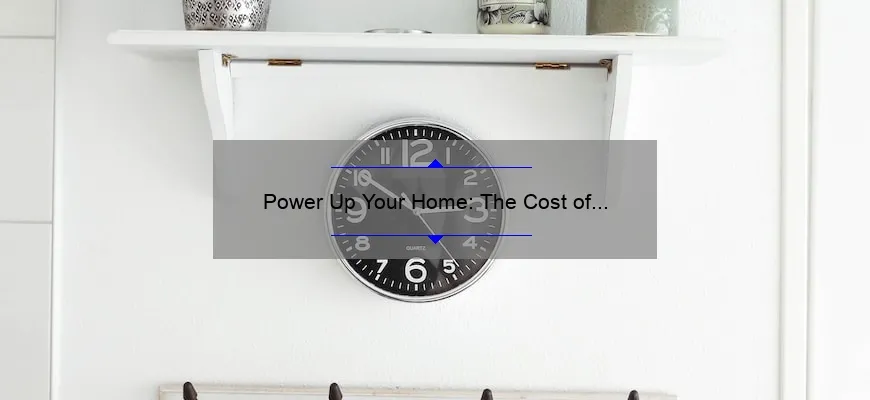Short answer how much to hook up generator to house: The cost of connecting a generator to a home can vary widely depending on the size and type of generator, electrical wiring configuration, local building codes, and labor costs. On average, homeowners may spend $1,500-4,000 for a professional installation. DIY installations can range from $800-2,500 but may result in safety issues if not installed correctly. Consult with a licensed electrician for specific cost estimates.
Step-by-Step Guide: How Much to Hook Up Generator to House
As human beings, we can never underestimate the importance of power – it is a fundamental aspect that makes our lives comfortable and convenient. When natural disasters or any unforeseen events occur, power outages become all too familiar. However, knowing how much to hook up generator to house can save you from this inconvenience.
The process of hooking up your generator might seem intimidating at first glance; however, with this step-by-step guide you will be ready for any outage emergency:
Determine Appropriate Generator Size
Before figuring out how much to hook up generator to house, one must determine what size capacity their home requires. This depends on several factors including square footage of space being powered or specific energy requirements by appliances.
Select Transfer Switch
Once you know your required electric capacity needs, select an appropriate transfer switch that suits those needs. The transfer switch works as a safety feature when using generators because it allows automatic switching between grid electricity and backup power supply making surges impossible.
Identifying Fuel Type For Hardware Compatibility
If you have decided upon purchasing a portable generator then make sure fuels purchased are compatible with yur hardware i.e., gasoline/diesel fuel engine-powered devices whilst standby generators usually require propane or natural gas interconnectivity
Installation And Wiring:
After receiving all necessary components wire installation according to guidelines mentioned by the manufacturer in manual accompanying device.There should be no possibility of short-circuiting due loose cables etc so its better if installation is done HVAC technician or licensed electrician for safe & proper configuration.
Final Precautions To Consider:
When wiring connections make suure all Fuses are installed properly prior turning on circuit breaker.Onc damage such as black-out/destruction has occured immediatley turn off main utility switches / breakers!
In conclusion,the above-mentioned parts were crucial aspects in understanding “how much to hookupgenerator to house” efficently.Additionally having realized importancekeeping manualin handy while operating these machines , following installation manual guidelines safety both optional & is something which cannot be overlooked. After having installed the device make sure fuel resources are stocked incase of emergencies that require backup power supply!
FAQ: Everything You Need to Know About How Much to Hook Up Generator to House
As a homeowner, you probably know how important it is to have electricity in your home. But what happens when the power goes out? Do you panic and scramble for candles and flashlights? Or do you have a backup plan in place?
One of the most reliable ways to ensure that you have access to electricity during an outage is by hooking up a generator to your house. However, many people are hesitant to take their first steps towards this solution because they don’t know much about it.
If you’re contemplating getting a generator or simply want more information on this topic, below are some frequently asked questions (FAQs) about how much it costs to hook up generators to houses:
1. What size generator should I buy?
This depends on several factors such as the type of appliances that will be using the generator, the number of rooms in your home, and its overall square footage. Your local electrician can recommend generators based on these factors; however, typically generators range from 5KW – 22KW depending on those variables.
2. How much does it cost to install a generator right now?
Installation prices vary according to location and type of unit being installed etc but generally paying $500-$3k purely depending upon installation complexity
3. Can I connect my portable generator into my electrical panel directly without transfer switch?
NO- You cannot connect into household wiring with adapter plugs or use extension cords connected directly into wall outlets; Doing so presents serious risk of electrocution/death causing accidents
4.What permament installations are required for whole-house systems
Home standby units require professional installation which includes mounting pad/block leveling set secure placing procedures rewiring changes updating vents working on gas lines transferring switch options layout design planning code approval permits inspection passage trenching concrete work besides regular standard maintenance kit safety provisions certification insurance checks
Overall having effective wisely chosen model safe reliable enough generated power back-up source can achieve vital optimum performance maintaining functioning comfortable home systems during periods of service interruptions outages. However, they are expensive and require time for installation.
In conclusion, a generator can serve as an essential backup power source to have in your house if you live in areas that often experience power outages or storms. A qualified electrician is recommended when installing one; he or she can ensure it’s properly positioned and connected — keeping both you and your loved ones safe while helping restore electricity quickly. Remember- safety first!
Top 5 Facts You Should Know About How Much to Hook Up Generator to House
As a homeowner, you never know when an emergency or natural disaster may strike causing power outages. When this occurs, having a backup generator is essential to ensuring your home stays powered up and functional during those trying times.
However, finding out how much it can cost to hook up a generator to your house has become increasingly challenging due to the diverse array of generators available in today’s market along with installation expenses varying from state-to-state; it could be overwhelming for someone looking into connecting their generator with their home.
To make things easier for you here are top 5 facts that should help you understand better how much it costs on average to connect your standby generator with the main electrical panel:
1. Power Needs
Your power needs will dictate what kind of generator you need in terms of wattage output. You’ll also have to consider whether you’re going for a standby (whole-home) model or simply filling energy gaps through portable models. This decision will significantly affect the total cost as larger size systems require more powerful transfer switches.
2. Wiring Requirements
The specifics surrounding wiring requirements vary based on various factors such as type of fuel sources, types of breakers needed at both ends, ground wire connections – all which greatly impact costs depending upon required ampacity capacity specificiations by NEC guidelines .
3. Fuel Types
Different generators use different fuels such as natural gas/propane/gasoline/diesel/bio-diesel , each carrying risks and benefits which have variable prices per KW ranging between $0.15-$0.60/kWh and fuel consumption ranges widely depending upon usage patterns affecting your monthly bill.
4.Installation Fees where Required
Installation fees are significant contributors towards the final tallying of figures involved while setting up home-based backup options especially if new pipe runs must be executed outside plumbing/hvac work prior its completion so these pricing estimates cannot always factor them in nor accurately predict unexpected trenching fees added later plus post-project cleanup.
5. Product Quality
Product quality cannot be ignored when it comes to purchasing an electrical generator for your home since you need something reliable that will last long periods of time in order to produce energy on-demand at a moment’s notice without fail or breakdown- and sometimes this reliability can come with a cost premium associated more costly parts on the high end models – but not always as there are some well-made economic options available too in the market.
Bottom Line:
Connecting your standby generator requires attention being paid to crucial details such as power needs, wiring requirements, fuel types amongst other considerations furnished above so erring here could mean putting yourself at risk if attempting these installations yourself (remember safety first policies) resulting in major setbacks later both financially and otherwise.
Have professionals assess your property together prior commencing works themselves; Hence Deciding whether it’s worth pursuing installation may also rely largely upon determining what kinds of expenses you might incur during its installation process beforehand!

